This article was co-authored by Ken Breniman, LCSW, C-IAYT. Ken Breniman is a Licensed Clinical Social Worker, Certified Yoga Therapist and Thanatologist based in the San Francisco Bay Area. Ken has over 15 years experience of providing clinical support and community workshops utilizing a dynamic combination of traditional psychotherapy and yoga therapy. He specializes in eclectic non-denominational yoga guidance, grief therapy, complex trauma recovery and mindful mortal skills development. He has a MSW from Washington University in St. Louis and an MA Certification in Thanatology from Marian University of Fond du Lac. He became certified with the International Association of Yoga Therapists after completing his 500 training hours at Yoga Tree in San Francisco and Ananda Seva Mission in Santa Rosa, CA.
wikiHow marks an article as reader-approved once it receives enough positive feedback. In this case, 100% of readers who voted found the article helpful, earning it our reader-approved status.
This article has been viewed 76,675 times.
Losing a parent at any age is difficult. This is especially true for teenagers, as the teenage years are already a complex and often an emotional time in a person's life. They might find their emotions are difficult to understand and deal with. Through compassion and understanding you can help a teen navigate this challenging time.
Steps
Providing Emotional Support
-
1Listen to the teen. The emotions associated with losing a parent can be very confusing. Helping them feel heard and valued is the most important role that you can play. Listen to their needs without judgment and try to meet them.[1]
- If you are unsure how to help them, say something like “What can I do to support you?”
-
2Validate their feelings. Every death is different. Some deaths are sudden. Other deaths are long, drawn out processes. There is no “right” or “wrong” way for a child to feel after their parent has died. Avoid comparing their loss to any loss that you have experienced.
- Try saying something like, “I can't imagine how hard this is for you. I am so sorry that you have to experience it.”
- Avoid telling them to “get over it” or “move on with their life.”
- On the other side of things, if the child is doing okay, do not try to make it more of an issue than it is. Let them guide you on how much they want to talk about it. You do not want to traumatize someone who is actually doing okay by making a big deal out of the event and forcing them to regress.
Advertisement -
3Be aware of when the parent died. Know if they died recently. Find out if the death was sudden, or expected because of prolonged illness. This will help you understand how long the teen has been grieving and how they are moving along in the grieving process.
-
4Understand the relationship the teen had with their parent. Some teens adore their parents, others may have abusive or neglectful parents that they harbor harsh feelings toward.[2]
- Even if the teen despised their parent, they will still need to grieve and cope after a death.
- Understand that many teens who had harsh feelings toward their parents will regret not having a better relationship. Keep this in mind and say things like “I know you may not have had the relationship you wanted with your parent(s), but it is clear that there was some love there and you should allow yourself some time to heal.”
-
5Allow them the space and time to grieve. Grieving is a natural process after a death but it may be a process that makes them uncomfortable. The mourning process looks different on everyone. Grief will change and take different forms throughout the teen's life, but it will never end. If they ask for space, let them have it. Be there when they need you, but if you can tell that they are overwhelmed by your presence, give them time to process their feelings.[3]
- Respect their privacy. If the teen says that they need space, respect that. Some people grieve privately instead of publicly.[4] Just make sure you keep the lines of communication open. You might say, "I'll wait for you to call if you need, but I'm always here."
-
6Share a personal story of grief. Sharing your personal story will make you seem more human and authentic to a teen. It may also help them to feel like discussing their grief is not a burden on your relationship. Tell them about a hard time that you went through, especially if it relates to their age.[5]
- If you had a close aunt or uncle (or a parent) die early in life, you can share that story with the teen you are mentoring.
-
7Continue supporting them. Grief can persist long after the death of the parent. The teen is likely to need your continued support throughout their teenage years and maybe into adulthood. Be there when they need help and give them someone to lean on.
Commemorating the Lost Parent
-
1Understand that special days will be difficult. Help the teen come up with a healthy way to deal with all of the “firsts”, such as the first Christmas or the first birthday without their parent. Come up with a plan for these days so they know what to expect.[6]
- Include the teen when planning the day.
- Allow the teen to talk about — or not talk about — their parent that day, whichever they feel like doing. Follow their lead in how much they want to talk about it.
- Don't be afraid to try something new, especially if a special day didn't go well in the past.
-
2Share your memories about their parent. If you knew their parent when they were younger or outside their home environment, share these stories with the teen. It will be refreshing for the teen to remember how many great experiences their parent had in their lifetime. Share as many happy memories as possible.
- For example, you might tell the teen about the time you and their deceased parent went ice skating and fell ten times.
- You might also tell them about the first time you met their parent.
-
3Help them to remember the good times with their parent. Encourage the teen to share these memories with you, too. This will help them feel connected to their deceased parent as they work through the grief. It will also give them a chance to think about their parent in a happy way as opposed to being focused on the death.
- Prompt stories by saying things like “Do you remember that time you and your parents went to the art museum?”
- You can also encourage them to write or express their feelings and stories in other artistic ways.
- Celebrating a deceased loved one is great way to stay connected to them.[7]
-
4Ask if there is a way the teen would like to honor their parent. This can include creating a memorial to them, planting a garden, writing a poem, or donating to a charity in their honor. This can help the teen feel as though their parent's importance lives on.
Mentoring a Teen Who Lost a Parent As a Child
-
1Become a parental figure in their life. Many teens who have lost a parent as a child seem to be searching for someone to fill that void in their teenage years. Be open to the idea of guiding and mentoring the teen during these difficult years. Strive to be a positive role model for the teen and avoid exposing them to destructive behaviors. This may also include supporting the teen emotionally or financially.
- This is a very delicate situation and it's important to remind the teen that you are not trying to replace their parent, but to help honor them by supporting the teen.
-
2Learn about the parent who was lost. The teen you are mentoring will appreciate your genuine concern for their lost parent. It will give them a chance share memories (if they have them) and family stories. Also, make an effort to understand the circumstances around the parent's death. This will help you be more sensitive around tough topics.[8]
- For example, if you know the teen's parent died in a car accident, you might be more patient if the teen seems timid in the driver's seat.
-
3Watch for warning signs. Although grief takes many forms, some methods of grieving can cause long-term damage. Be sure to watch for signs of drinking, drug use, or other harmful methods of grieving and try to guide the teen to healthier methods of grieving.
- Warning signs of dangerous behavior can be subtle. People are unlikely to witness drinking or drug use directly, but may observe lying, significant weight loss, changes in sleeping patterns, etc.
- Suggest a physical activity to help channel their grief into something positive and healthy. Running, hiking, or yoga are all great physical activities that could help alleviate stress and center your emotions.
- If the teen discusses thoughts of suicide or hurting themselves, seek professional help immediately.
-
4Know what holidays are hard. Grief can last for a long time, especially in children and teens. Find out if there are any specific days that are more difficult for the teen. Many teens will struggle with holidays such as Christmas, or the deceased parent's birthday.[9]
- Try to avoid downtime during these days. Keeping the teen busy will help distract them from their sadness.
- Be sure to remember their parent on this day. Say things like “I know you miss your parent(s), and you should keep them in mind and try to enjoy the day.”
Taking Care of Yourself First
-
1Seek therapy or counseling for yourself. You cannot provide anyone emotional support if you are not emotionally stable. Do not lean on the teen to be a source of support for you. Many adults treat teenagers as adults during times of grief instead of treating them as adolescents.[10]
- If individual therapy does not seem like your cup of tea, consider a support group or an online chat room.
-
2Remember to eat well. If you are also grieving, you may find it difficult to eat anything at all. Be intentional about eating. Low blood sugar makes people irritable. You will provide better emotional support to the teen if you are well nourished.[11]
- Make a meal for you and the teen to share or take them out to eat. Sharing a meal with someone is very therapeutic.
-
3
Expert Q&A
-
QuestionWhat are some good ways to celebrate the life of a lost loved one?
 Ken Breniman, LCSW, C-IAYTKen Breniman is a Licensed Clinical Social Worker, Certified Yoga Therapist and Thanatologist based in the San Francisco Bay Area. Ken has over 15 years experience of providing clinical support and community workshops utilizing a dynamic combination of traditional psychotherapy and yoga therapy. He specializes in eclectic non-denominational yoga guidance, grief therapy, complex trauma recovery and mindful mortal skills development. He has a MSW from Washington University in St. Louis and an MA Certification in Thanatology from Marian University of Fond du Lac. He became certified with the International Association of Yoga Therapists after completing his 500 training hours at Yoga Tree in San Francisco and Ananda Seva Mission in Santa Rosa, CA.
Ken Breniman, LCSW, C-IAYTKen Breniman is a Licensed Clinical Social Worker, Certified Yoga Therapist and Thanatologist based in the San Francisco Bay Area. Ken has over 15 years experience of providing clinical support and community workshops utilizing a dynamic combination of traditional psychotherapy and yoga therapy. He specializes in eclectic non-denominational yoga guidance, grief therapy, complex trauma recovery and mindful mortal skills development. He has a MSW from Washington University in St. Louis and an MA Certification in Thanatology from Marian University of Fond du Lac. He became certified with the International Association of Yoga Therapists after completing his 500 training hours at Yoga Tree in San Francisco and Ananda Seva Mission in Santa Rosa, CA.
Licensed Clinical Social Worker & Certified Yoga Therapist Try participating in an activity that you used to do with your loved one. For instance, if you used to go horseback riding with a late relative, you might invite a partner or close friend to go riding with you. This way, you can celebrate your loved one while staying connected with the people in your life.
Try participating in an activity that you used to do with your loved one. For instance, if you used to go horseback riding with a late relative, you might invite a partner or close friend to go riding with you. This way, you can celebrate your loved one while staying connected with the people in your life. -
QuestionWhat are some misconceptions about death and dying?
 Ken Breniman, LCSW, C-IAYTKen Breniman is a Licensed Clinical Social Worker, Certified Yoga Therapist and Thanatologist based in the San Francisco Bay Area. Ken has over 15 years experience of providing clinical support and community workshops utilizing a dynamic combination of traditional psychotherapy and yoga therapy. He specializes in eclectic non-denominational yoga guidance, grief therapy, complex trauma recovery and mindful mortal skills development. He has a MSW from Washington University in St. Louis and an MA Certification in Thanatology from Marian University of Fond du Lac. He became certified with the International Association of Yoga Therapists after completing his 500 training hours at Yoga Tree in San Francisco and Ananda Seva Mission in Santa Rosa, CA.
Ken Breniman, LCSW, C-IAYTKen Breniman is a Licensed Clinical Social Worker, Certified Yoga Therapist and Thanatologist based in the San Francisco Bay Area. Ken has over 15 years experience of providing clinical support and community workshops utilizing a dynamic combination of traditional psychotherapy and yoga therapy. He specializes in eclectic non-denominational yoga guidance, grief therapy, complex trauma recovery and mindful mortal skills development. He has a MSW from Washington University in St. Louis and an MA Certification in Thanatology from Marian University of Fond du Lac. He became certified with the International Association of Yoga Therapists after completing his 500 training hours at Yoga Tree in San Francisco and Ananda Seva Mission in Santa Rosa, CA.
Licensed Clinical Social Worker & Certified Yoga Therapist One misconception is that grief has to be time-limited. Instead of trying to get to the next stage in your grief, look for ways to appreciate the constant change of everyday life, like the cycles of the moon. Experiencing constant change helps us confront some of the misconceptions about death or grief.
One misconception is that grief has to be time-limited. Instead of trying to get to the next stage in your grief, look for ways to appreciate the constant change of everyday life, like the cycles of the moon. Experiencing constant change helps us confront some of the misconceptions about death or grief. -
QuestionWhat are some mistakes people make when they're trying to comfort a grieving person?
 Ken Breniman, LCSW, C-IAYTKen Breniman is a Licensed Clinical Social Worker, Certified Yoga Therapist and Thanatologist based in the San Francisco Bay Area. Ken has over 15 years experience of providing clinical support and community workshops utilizing a dynamic combination of traditional psychotherapy and yoga therapy. He specializes in eclectic non-denominational yoga guidance, grief therapy, complex trauma recovery and mindful mortal skills development. He has a MSW from Washington University in St. Louis and an MA Certification in Thanatology from Marian University of Fond du Lac. He became certified with the International Association of Yoga Therapists after completing his 500 training hours at Yoga Tree in San Francisco and Ananda Seva Mission in Santa Rosa, CA.
Ken Breniman, LCSW, C-IAYTKen Breniman is a Licensed Clinical Social Worker, Certified Yoga Therapist and Thanatologist based in the San Francisco Bay Area. Ken has over 15 years experience of providing clinical support and community workshops utilizing a dynamic combination of traditional psychotherapy and yoga therapy. He specializes in eclectic non-denominational yoga guidance, grief therapy, complex trauma recovery and mindful mortal skills development. He has a MSW from Washington University in St. Louis and an MA Certification in Thanatology from Marian University of Fond du Lac. He became certified with the International Association of Yoga Therapists after completing his 500 training hours at Yoga Tree in San Francisco and Ananda Seva Mission in Santa Rosa, CA.
Licensed Clinical Social Worker & Certified Yoga Therapist The biggest mistake is trying to do something for the person rather than trying to be present with them.
The biggest mistake is trying to do something for the person rather than trying to be present with them.
Warnings
- Watch for signs that the teen needs additional emotional support. Some of these signs include alcohol or drug use, severe depression, excessive sleeping, or struggling in school. If these occur, you may need to seek professional help for the teen.⧼thumbs_response⧽
References
- ↑ https://www.dougy.org/resource-articles/how-to-help-a-grieving-teen
- ↑ http://educationnorthwest.org/sites/default/files/resources/factsheet26.pdf
- ↑ https://www.dougy.org/resource-articles/how-to-help-a-grieving-teen
- ↑ http://www.cancercare.org/publications/66-helping_teenagers_who_have_lost_a_parent
- ↑ http://educationnorthwest.org/sites/default/files/resources/factsheet26.pdf
- ↑ http://www.mlive.com/news/grand-rapids/index.ssf/2013/06/when_grief_darkens_fathers_day.html
- ↑ Ken Breniman, LCSW, C-IAYT. Licensed Clinical Social Worker & Certified Yoga Therapist. Expert Interview. 24 April 2020.
- ↑ http://educationnorthwest.org/sites/default/files/resources/factsheet26.pdf
- ↑ http://educationnorthwest.org/sites/default/files/resources/factsheet26.pdf
About This Article
Losing a parent can be devastating for a teen, but you can be there for them by sharing happy memories of their parent if you know them. You can also encourage them to share stories of their own, which will help them feel connected to their deceased parent. However, if the teen asks for space, you should respect that, as some people prefer to grieve privately. Additionally, you should keep an eye out for warning signs, such as the teen drinking or using drugs. Instead, encourage them to channel their energy into healthier activities, like running, hiking, or yoga. If the teen discusses thoughts of suicide or hurting themselves, you should seek professional help immediately. For more tips from our Counselor co-author, including how to be a good role model for the teen, read on!
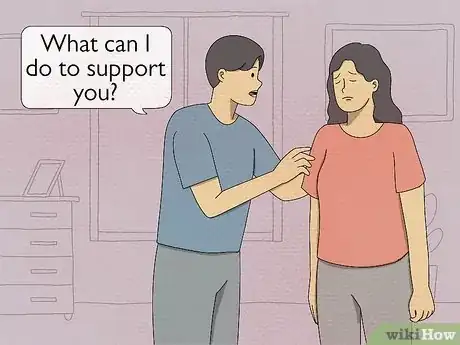
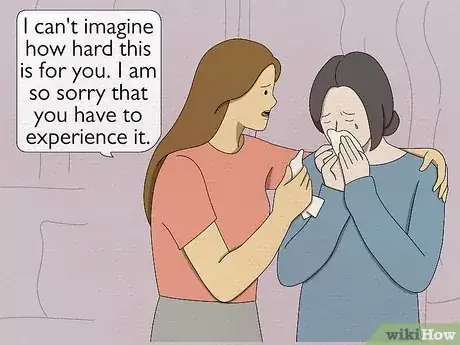
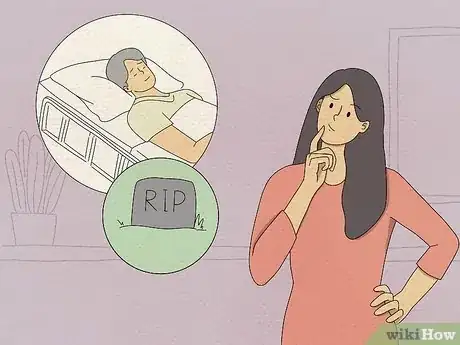
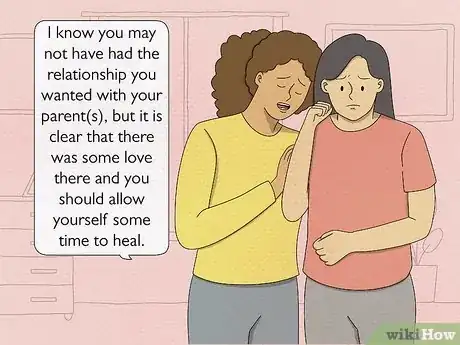



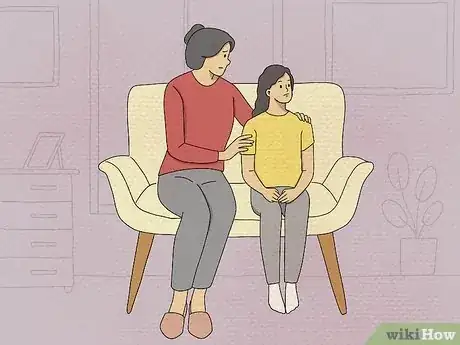
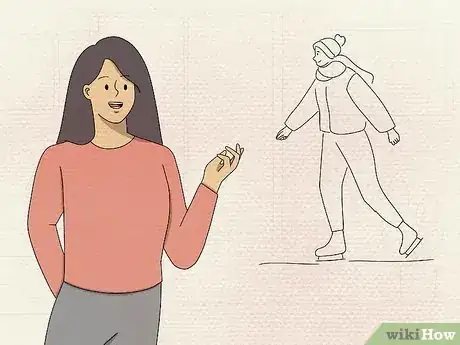
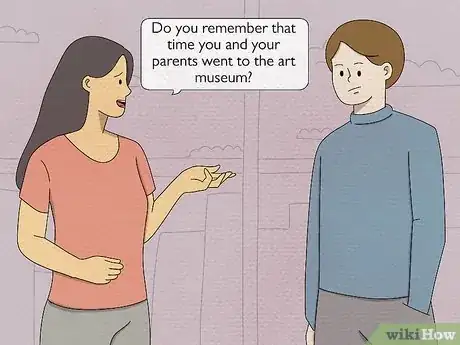


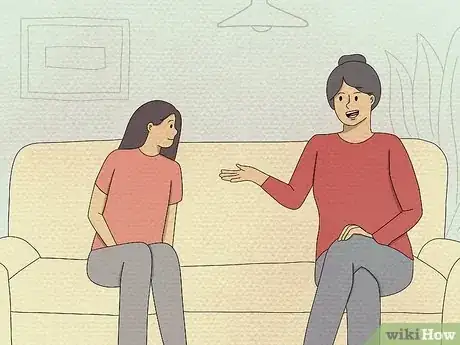


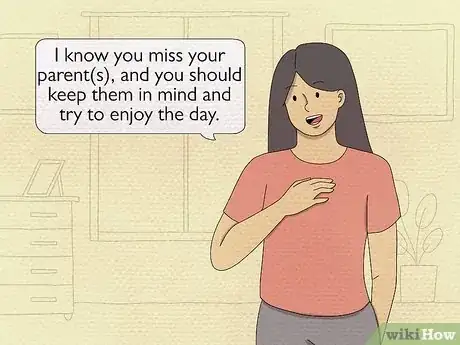
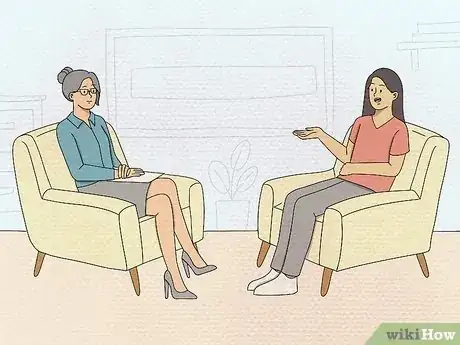


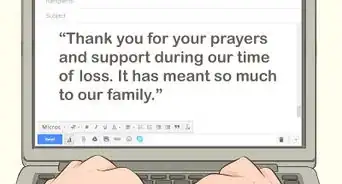

-Step-20-Version-2.webp)









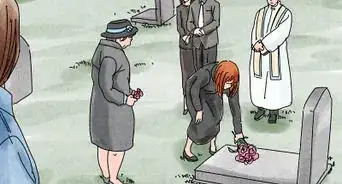












-Step-20-Version-2.webp)



































